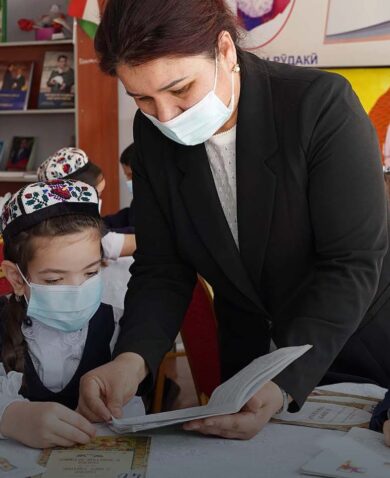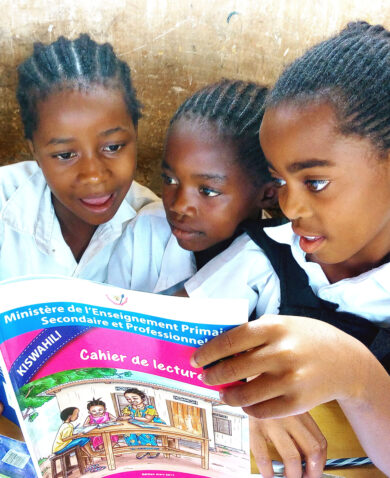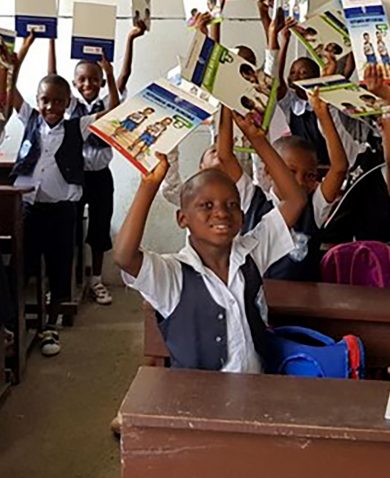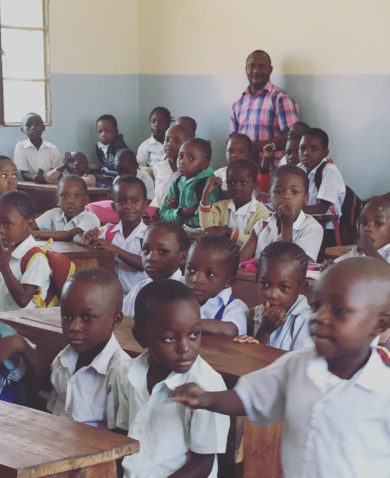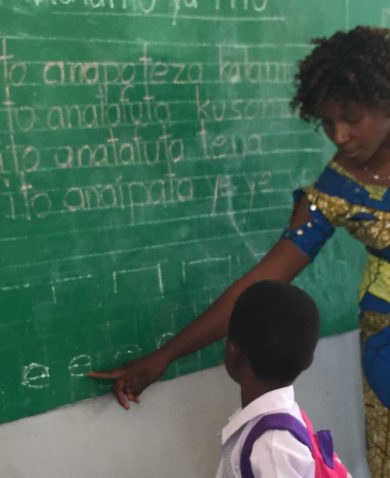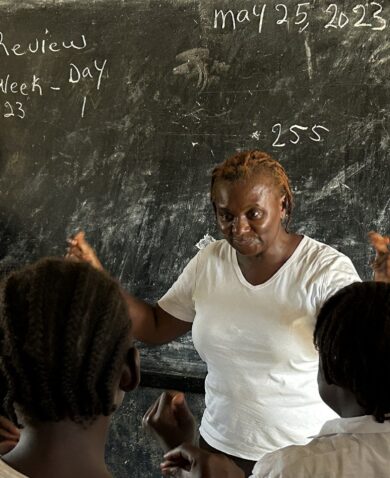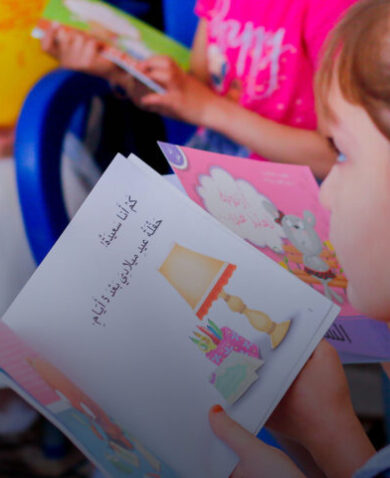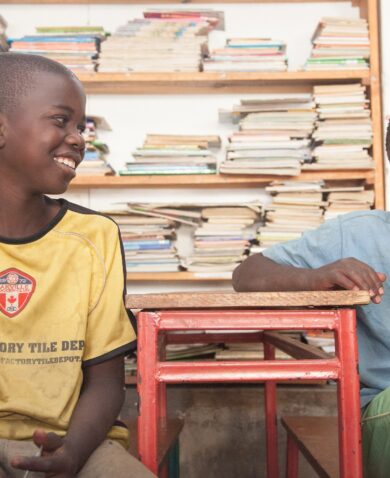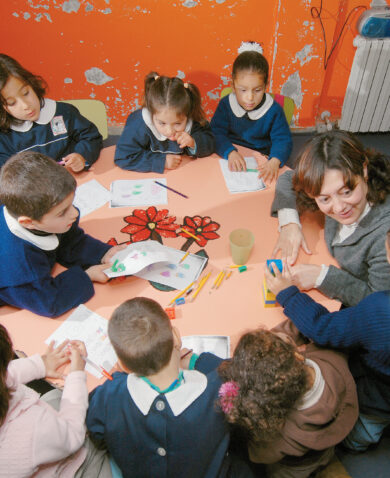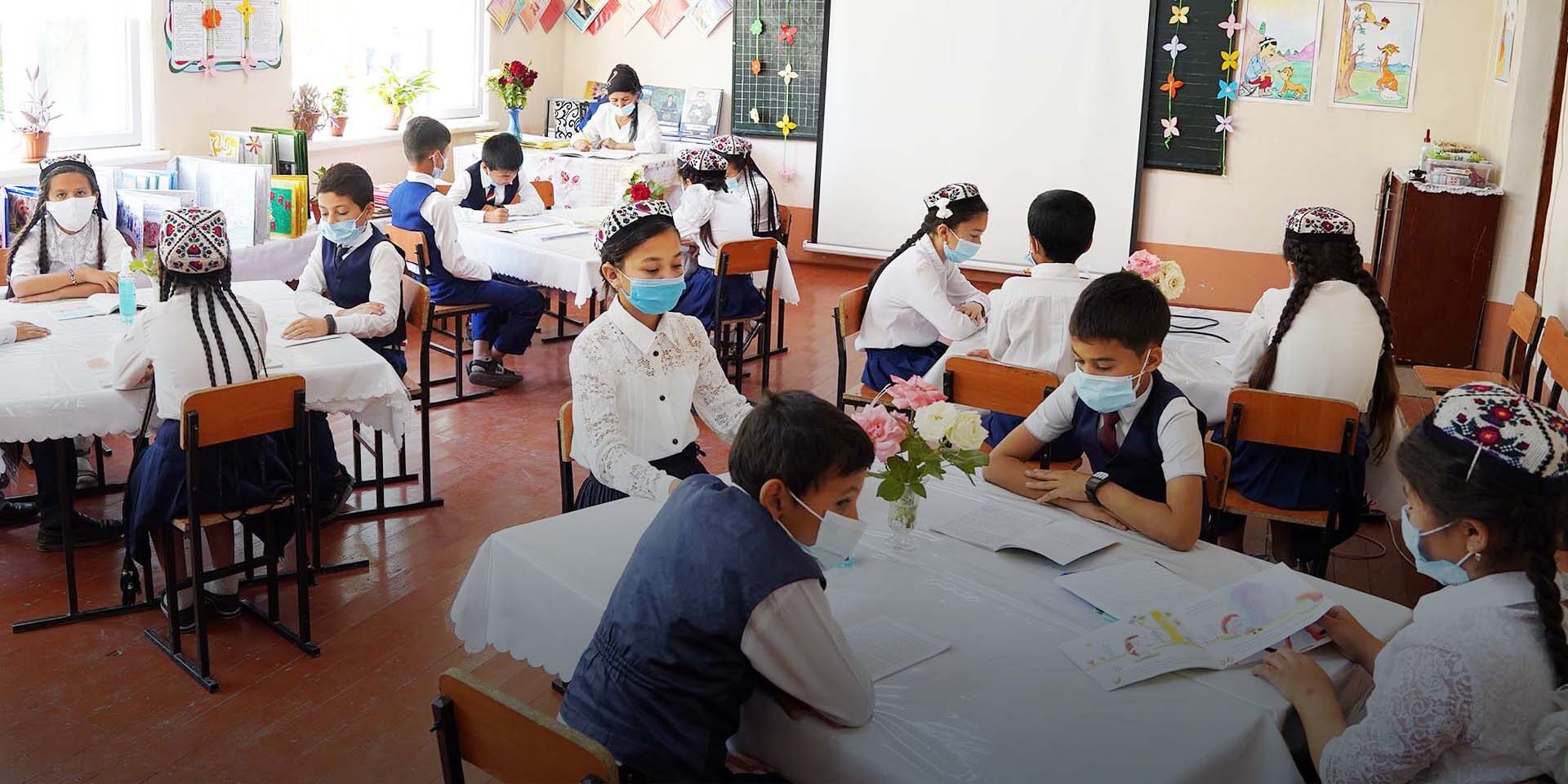
Innovating Techniques and Technology to Improve Education in Tajikistan .
April 14, 2022In Tajikistan, data-driven training, lessons from other countries, and community support have kept students — and teachers — learning.
In 2021, village elders in the small Tajik community of Isfisor noticed a woman who frequently traveled the unpaved road through their neighborhood to visit the local school. Curious about the nature of the woman’s visits, they asked the school’s director, Nazira Khabibova.
“I explained that our school works with the USAID Read with Me project,” says Khabibova, “and this trainer comes to our school every week to train our teachers on innovative teaching techniques.”
The trainer is Mastona Khodjiboeva, and her visits are part of a Chemonics-implemented education training model in Tajikistan that is using data to overhaul an outdated and financially challenged national education system. One key component of this model is deploying education coaches to remote areas to provide face-to-face support for teachers. This program has helped discover the data points to reimagine a struggling system — and is bringing hope to local communities.
Inspired by what they learned about the purpose of Khodjiboeva’s visits, the village elders in Isfisor donated money from their own monthly pensions to purchase a computer and projector to help the trainer with her mission. Then, they paved the road through the village to the school entrance to make it easier for her to reach it.

The USAID Read with Me program and its successor, the Learn Together Activity, initiative are Chemonics-implemented programs that apply successful, innovative teaching practices from other parts of the world to help an education system that has struggled since the fall of the Soviet Union and the devastating civil war that followed.
“The people of Tajikistan are passionate about improving their educational system,” says Faiziddin Niyozov, technical lead for the Learn Together Activity in Tajikistan. “And we recognized that our inflexible, antiquated system of education simply wasn’t meeting our needs — a change was necessary.”
With change in mind, Tajikistan’s Ministry of Education and Science began partnering with USAID on the Read with Me literacy initiative in 2016, and then in 2021 on the Learn Together Activity development program — a five-year project to improve Tajik primary students’ learning skills, with a focus on improving reading comprehension, critical thinking skills, and mathematics.
Since their inception, these programs have:
- Procured and developed age-appropriate supplementary reading materials for Tajik students
- Trained teachers and other educators in contemporary, constructive, competency-based literacy standards
- Strengthened capacity of the Ministry of Education and Science to invest in early-grade reading
- Surfaced high-yielding performance methodologies
- Built partnerships with the private sector, parent-teacher associations, and local organizations
- Built inclusive, child-friendly classrooms and programming
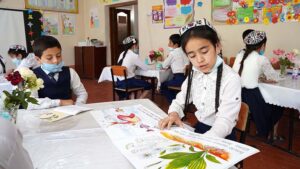
In Khujand, students in Tahminakhon Huseynova’s reading class get excited when she hands out 10 perfectly wadded paper balls at the beginning of class. Those students know that they’ll be asked to answer a question and then throw their ball into a basket at the front of the class while their classmates look on. Learner-friendly engagement techniques like this are monitored by education coaches who electronically record the performance of Huseynova and her learners. The data helps guide and predict successful teaching outcomes.
Data collected through the Read with Me and Learn Together Activity programs have already helped guide teachers from rigid teaching practices toward effective methods. In one example, the data showed that a teacher that uses positive reinforcement, such as rephrasing a problem or providing students with additional time to answer a question, yields significantly higher correct word-per-minute oral fluency scores versus teachers that use outdated techniques, like shaming or negatively disciplining students. Data like this helps teachers and coaches improve and tailor learning to their communities.
“We begin with the development of a community-centered process and then create a platform that is bespoke for the context — one that can be institutionalized and owned by local stakeholders to drive continuous improvement within the system,” says Audrey Spencer, Chemonics’ global practice lead for its Education and Youth Practice.
A core component of the Read with Me and the Learn Together Activity programs is the use of community-based methodological units — like the one in Isfisor — that introduce inventive teaching techniques to educators like Huseynova. Modeled after successful initiatives in other countries, community-based methodological units are training centers in a centralized community where nearby teachers can more easily access ongoing and tailored professional development.
“Previously, teachers used to sit in a training room for 12 days and receive lectures on outdated theory,” explains Terry Giles, Chemonics’ chief of party for the Learn Together Activity project. “These new programs make it much easier for teachers to receive training that is digestible, empowering, and practical.”
As part of these programs, teaching coaches gather data on tablets during visits to Tajik classrooms in person or by video. Through a partnership between Chemonics and One World Network of Schools, this data is used locally as immediate feedback for teachers to identify and match evidence-based techniques to improve teaching and learning. From school to national levels, the data is used to study high-performing classrooms and school districts to identify, codify, and replicate what works at scale.
“The new data-gathering process we’ve put in place is improving the quality of our education system and the performance of our students,” says Niyozov. “This is not only giving students a strong foundation for learning in their primary schooling, but preparing the next generation to further the development of Tajikistan as a nation.”
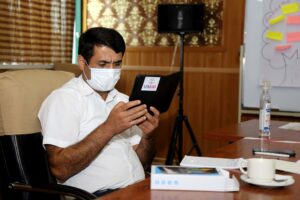
Based on the results of Early Grade Reading Assessment scores, oral fluency and reading comprehension indicators in Tajikistan have significantly improved. In April 2018, 2019, and 2021, the Ministry of Education and Science and the Read with Me program conducted a nationwide baseline, midline, and endline Early Grade Reading Assessment. Results found that all four groups of students — Tajik grades 2 and 4 and Russian grades 2 and 4 — showed significant improvements across measured areas.
“We are getting positive results,” says former First Deputy Minister of Education and Science Muhammaddovud Qayum Salomiyon. “This is, of course, the merit of the assessment process and the correct action of the teachers in the schools, who appreciated these merits and efforts, and directed their activities in the right direction to obtain the final positive results.”
For many Tajik teachers, success is tied directly to their enjoyment of the Read with Me and Learn Together Activity teaching techniques.
“These simple, but effective, techniques have improved my ability to engage with students and have produced measurable improvement in my students’ performance,” says Huseynova. “Read with Me training was a great inspiration for me as a primary teacher. I was very eager to try out the proposed techniques in my Tajik language classes initially, and slowly began trying the ideas in math lessons, as well.”
This innovative education model of continuous professional development for teachers — with a blended learning design and a platform that provides professional development content and data for decision-making — is poised for expansion in Tajikistan, with expected scaling from 1,000 schools and 6,000 teachers to 3,100 schools and nearly 30,000 teachers nationwide. In addition, the model is being adapted and explored for deployment in other countries.
“The process and platform were developed with sustainability and institutionalization in mind,” says Spencer. “By incorporating concepts that have previously yielded positive outcomes in countries like South Africa, Chile, and Mexico, we have been able to help kids become stronger readers and critical thinkers.”
According to Isfisor village elder Akhmadjon Khabibov, it is the shared goal of strengthening the educational opportunities for Tajikistan’s next generation that moved him and his fellow elders to offer their support to USAID programs like Read with Me and Learn Together Activity.
“We bought equipment from our own funds so that children could learn,” says Khabibov. “After all, our grandchildren and children of this makhalla study in this school. We plan to donate another computer at the end of this year.”
Banner Image: Reading class at school. Children read the books donated by the USAID Read with Me project.









